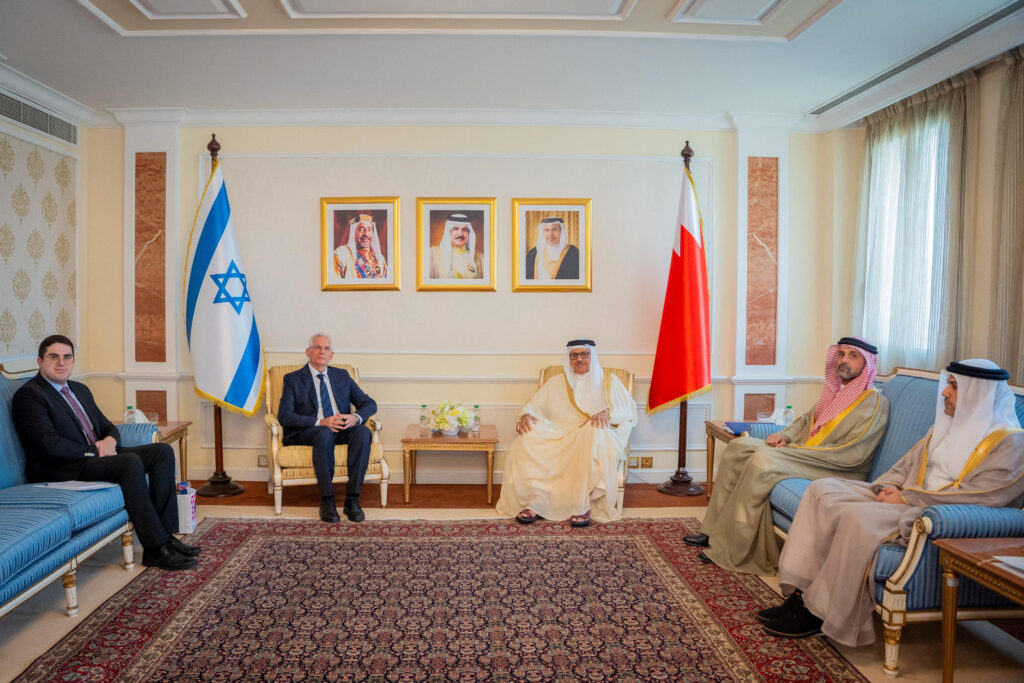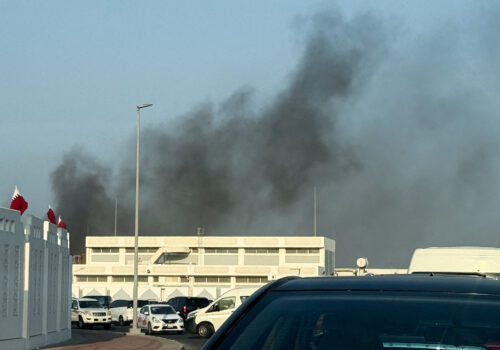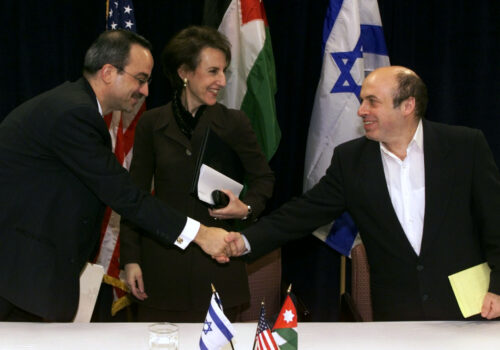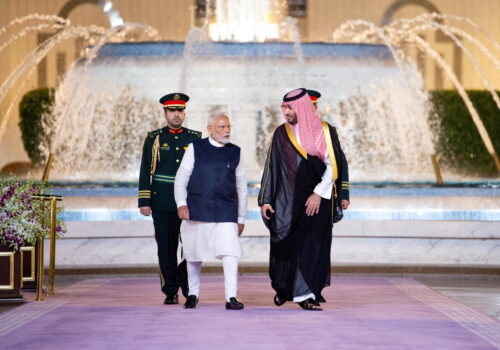In mid-August, the N7 Initiative, a partnership between the Atlantic Council and Jeffrey M. Talpins Foundation, led a delegation of senior bipartisan and bicameral congressional staff fellows to Bahrain, the United Arab Emirates, and Israel.
The visit came at a moment of both profound tension and opportunity. It demonstrated that one cannot only see the region reflected by one trend; the Middle East is far more complex than that. While the conflict in Gaza is both consuming headlines and having widespread impacts in the region and beyond, a variety of other trends continue to drive a long-term interest in regional cooperation.
Overall, we discovered that despite the setbacks of war, the Abraham Accords continue to provide a durable platform for imagining a more stable, connected, and prosperous Middle East.
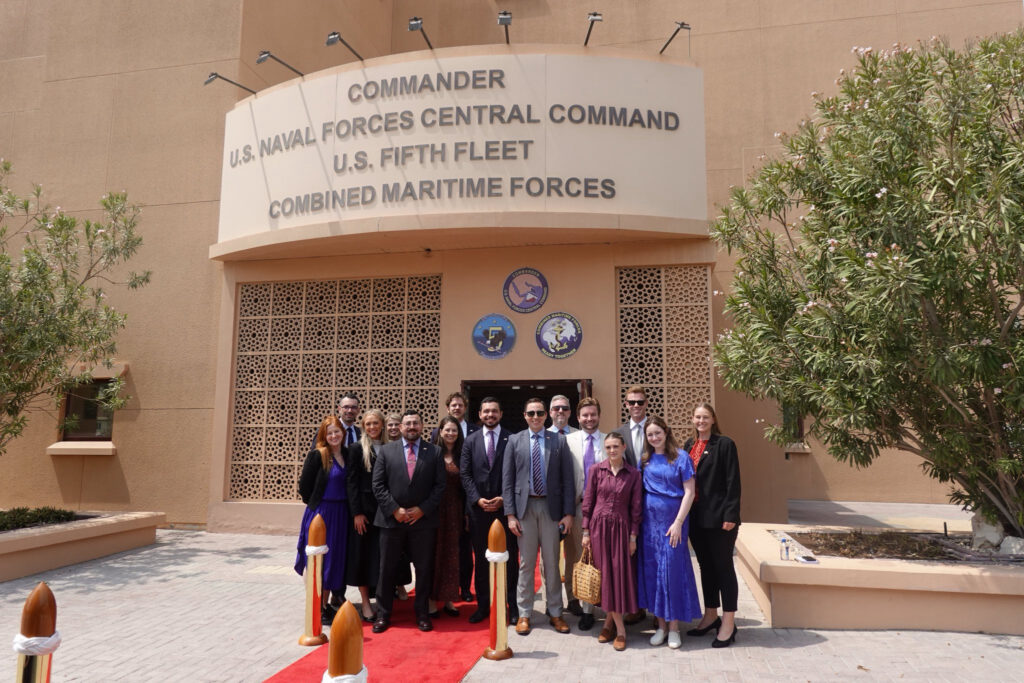
Our team witnessed Israel escalating operations in Gaza from a nearby Kibbutz and saw growing bilateral tensions with Israel only days before the United Arab Emirates (UAE) publicly threatened the viability of the Abraham Accords over the possibility of Israel’s annexation of the West Bank, which eventually led to Prime Minister Benjamin Netanyahu removing West Bank annexation from the government’s agenda.

Our delegation also observed the continued trauma of the October 7, 2023, Hamas attacks that launched the war in Gaza, including during meetings with hostage families and a tour of the Nova festival site.
At the same time, interlocutors in Bahrain and the UAE expressed their hope for a Middle East that is more integrated and interconnected, identifying specific opportunities for collaboration, and pointing to windows of opportunity in the region—all of which they felt would be bolstered by an end to the war in Gaza and a two-state solution.
Overall, our team came away with three major opportunities to advance regional integration in this current context.
SIGN UP FOR THIS WEEK IN THE MIDEAST NEWSLETTER
Multilateral initiatives
Officials in Manama and Abu Dhabi see continued opportunity in economic and strategic initiatives related to regional integration.
One promising regional integration project the N7 Initiative has been working to advance is the India-Middle East-Europe Economic Corridor (IMEC). IMEC was top of mind for officials across all three capitals following the August 5 meeting of IMEC signatories in New Delhi. They voiced confidence that the corridor would one day physically integrate the region while also noting the challenging political environment could slow progress along the most sensitive segments of the corridor. While Israel is not yet an official IMEC signatory, Israeli officials voiced support for the corridor and envisioned themselves as an integral link for the project in the long term.
Another such initiative that drawing significant attention was the Comprehensive Security Integration and Prosperity Agreement (C-SIPA). Originally a bilateral security agreement between Bahrain and the United States, CSIPA recently expanded to include the United Kingdom (UK). The UK joining C-SIPA is the first step in transforming the agreement into a regional security architecture that could include US partners in Europe, the Middle East, and Asia—and eventually Israel. The delegation heard interest in building on the momentum of the UK’s entry to incorporate other countries from Europe and the region.
The promise of Syria
In a trend that would have seemed impossible months ago, Syria has emerged as one of the most opportune prospects for new relations with Israel after the ousting of Bashar al-Assad’s regime in December.
As the delegation conducted meetings in Abu Dhabi, reports surfaced that the United States brokered the second round of trilateral talks between Israeli Minister of Strategic Affairs Ron Dermer and Syrian Foreign Minister Assad al-Shaibani. The meeting, held in Paris, was the first public engagement since unrest in Sweida one month prior, and signaled that both governments recognized the strategic value in quickly reaching a security agreement that could one day lead to quiet cooperation.
While the N7 Initiative is dedicated to advancing these aims, including with our team’s recent trip to Damascus, we recognize that the window for such cooperation can close quickly. Iran and its proxy network, the Islamic State of Iraq and al-Sham (ISIS), and Turkey are all looking to expand or rebuild political and military influence in Syria. These actors could serve as spoilers to potential Israel-Syria cooperation. We heard directly from our Israeli counterparts that a security agreement—that could even pave the way for normalization between the two countries in the long term—needed to include a buffer zone on the Syria-Israel border, security assurances for both sides, inclusion and protection of Syria’s minority population, and a humanitarian corridor into Syria.
Opportunity in Central Asia
Another, more nascent opportunity for expanding the Abraham Accords is Central Asia. The recent Trump administration-brokered peace declaration between Armenia and Azerbaijan has created momentum for new connectivity and removed some of the biggest political barriers to potential normalization between Israel and Azerbaijan. It has also sparked new conversations for the entry of Uzbekistan and Kazakhstan into the Abraham Accords. The new agreement could create a corridor that would link Uzbekistan and Kazakhstan through Azerbaijan, Armenia, and Turkey to the Mediterranean Sea, giving the United States and Israel access to energy and critical minerals from Central Asia while bypassing Russia and Iran. Such a corridor could provide a valuable basis for bringing Azerbaijan, Kazakhstan, and Uzbekistan into the Abraham Accords in some capacity, while bolstering Middle East regional security and prosperity.
While these countries already have normalized relations with Israel, the potential of codifying a closer partnership with Abraham Accords partners and new legislation to counteract decades-old limitations to grant these countries permanent normal trade relations with the United States could provide powerful diplomatic and economic incentives to join. There is already a precedent for such steps—Washington has previously done this for Russia, Ukraine, Moldova, and Georgia.
Looking ahead
Our visit came at a moment that felt like the bedrock of the Abraham Accords was in question. But at the same time, we witnessed how the region continues to move forward—quietly, and sometimes boldly—towards new forms of cooperation. Momentum is still building around frameworks like IMEC and C-SIPA which can be the foundation for deeper regional integration with Israel. Unexpected breakthroughs are unfolding in places like Syria and Central Asia. Overall, it was clear that while progress may be conditional on the politics on the ground, the vision of the Accords remains alive and well.
Emily Milliken is the associate director for the N7 Initiative, a partnership between the Atlantic Council and Jeffrey M. Talpins Foundation.
Gershom Sacks is the deputy director for N7 Initiative, a partnership between the Atlantic Council and Jeffrey M. Talpins Foundation.
Further reading
Tue, Sep 9, 2025
Israel just struck Hamas leadership in Qatar. What’s next?
Fast Thinking By
Our experts share their insights on what Israel’s attack on Hamas political leadership in Qatar will mean for its campaign in Gaza.
Mon, Sep 8, 2025
Revitalizing Qualified Industrial Zones can help revive Middle East integration
MENASource By
Revitalized QIZs can transition from political instruments into dynamic engines of inclusive growth, resilience, and regional stability.
Tue, Jun 3, 2025
India-Gulf relations are muted—but mobilizing
MENASource By Jonathan Fulton
The depth of Indian-Gulf relations creates a strong foundation for increased India-Middle East integration over the coming decades.
Image: Bahrain's Foreign Minister, Abdullatif bin Rashid Al-Zayani and Israel's new ambassador to Bahrain, Shmuel Revel pose for a photograph on the day Al-Zayani receives Revel's credentials at Ministry of Foreign Affairs headquarters in Manama, Bahrain, August 27, 2025. Bahrain News Agency/Handout via REUTERS THIS IMAGE HAS BEEN SUPPLIED BY A THIRD PARTY. TPX IMAGES OF THE DAY
